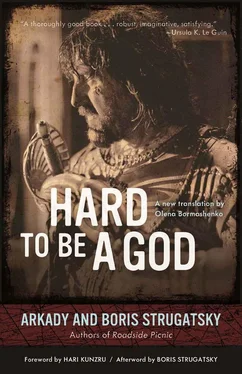“I’ll read him my Treatise on Rumors,” said Brother Nanin cheerfully. “Thank you, noble don.”
“What won’t a man do in memory of his father!” said Rumata. “Now tell me where to find Father Tarra.”
Brother Nanin stopped smiling and started blinking in confusion. “There was a fight here yesterday,” he said. “And Father Tarra had a bit too much to drink. And then he’s a redhead… They broke his rib.”
Rumata grunted in vexation. “What rotten luck!” he said. “Why do you all drink so much?”
“Sometimes it’s hard to resist,” Brother Nanin said sadly.
“True,” said Rumata. “Well, here are two more gold pieces. Take good care of him.”
Brother Nanin caught Rumata’s hand and bent down toward it. Rumata stepped back. “Now, now,” he said. “That’s not one of your best jokes, Brother Nanin. Good-bye.”

The port smelled like nowhere else in Arkanar. It smelled of saltwater, rotten pond scum, spices, tar, smoke, and old salted meat; the taverns reeked of cooking, fried fish, and stale beer. The humid air was thick with swearing in many languages. Thousands of strange-looking people thronged on the piers, in the narrow alleys between the warehouses, and by the taverns: disheveled sailors, pompous merchants, sullen fishermen, dealers in slaves, dealers in women, painted girls, drunken soldiers, some dubious individuals hung with weapons, and outlandish vagrants with gold bracelets on their dirty paws. Everyone was agitated and angry. By the order of Don Reba, it had already been three days since a single ship, or a single canoe, had been allowed to leave port. Gray troopers were toying with their rusty butcher’s axes by the docks—spitting occasionally, brazenly and gloatingly glancing at the crowd. On the detained ships, big-boned, copper-skinned people dressed in furry animal skins and copper caps were crouching in groups of five or six—barbarian mercenaries, worthless in close combat but terrifying like this, at a distance, due to their enormously long blowpipes that fired poison darts. And beyond the forest of masts, motionless on the open sea, loomed the long war galleys of the Royal Navy. From time to time they emitted red jets of flame and smoke, making the sea blaze up—burning petroleum for intimidation.
Rumata passed the customs office, where sullen sea dogs huddled in front of the locked doors, vainly waiting for permission to set sail, and pushed his way through the clamorous crowd, from which you could buy just about anything, from slave women and black pearls to drugs and trained spiders. He came out by the piers, looked askance at the row of bloated corpses in sailor’s jackets laid out in the sun for public display, and taking a detour through a junk-filled vacant lot, entered the reeking alleyways on the outskirts of the port. It was quieter here. Half-naked girls dozed in the doors of the squalid dens, a drunken soldier with his pockets inside out was lying facedown and bleeding at an intersection, and suspicious figures with the pale faces of the night crept along the walls.
This was the first time Rumata had been here during the day, and initially he was surprised that he didn’t attract attention; the bleary eyes of all the passersby looked either past him or seemingly through him, although they did move aside and give way. But as he was rounding a corner, he happened to turn around and had time to notice a dozen varied heads—male and female, long-haired and bald—instantly retracting into doorways, windows, and alleys. Then he became cognizant of the strange atmosphere of this vile place, an atmosphere not of hostility or danger but of some unsavory, greedy interest.
Pushing a door open with his shoulder, he entered one of the dens, where an old man with the face of a mummy was dozing behind a counter in a gloomy little hall. The tables were empty. Rumata silently approached the counter and was about to flick the old man’s long nose when he suddenly realized that the sleeping old man wasn’t sleeping at all but was examining him carefully through his half-closed eyelids. Rumata threw a coin on the counter, and the old man’s eyes immediately shot open. “What would the noble don like?” he asked briskly. “Weed? Snuff? Girls?”
“Drop it,” said Rumata. “You know exactly why I come here.”
“Why, it’s the noble Don Rumata,” exclaimed the old man in a tone of extraordinary surprise. “I did think something looked familiar…”
After saying this he lowered his eyelids again. Everything was clear. Rumata walked around the counter and squeezed through a narrow door into a tiny adjacent room. Here it was cramped and dark, and the stuffy air had a sour reek. A wizened old man in a flat black cap stood behind a tall desk in the middle of the room, bent over some papers. An oil lamp flickered on the desk, and the only things visible in the gloom were the faces of the people sitting motionless by the walls. Rumata, keeping a hand on his swords, also groped for a stool by the wall and sat down. This place had its own laws and its own etiquette. No one paid any attention to the newcomer; if a man came here, then that was how it should be, and if it wasn’t how it should be, he would disappear in the blink of an eye. And you’d never find him, even if you searched the world over. The wizened old man diligently scratched his stylus against the paper; the people by the wall sat motionless. From time to time, one or another of them would sigh deeply. Unseen flytrap lizards ran up and down the walls with a light pitter-patter.
The motionless people by the walls were the chiefs of the robber bands; Rumata had long known some of them by sight. These dull beasts weren’t worth much in and of themselves. Their psychology was no more complicated than that of the average shopkeeper. They were ignorant, merciless, and had a way with knives and short cudgels. The man behind the desk, on the other hand…
His name was Waga the Wheel, and he was the all-powerful, uncontested head of all the criminal forces of the Land Beyond the Strait, which stretched from the Pitanian marshes to the west of Irukan to the maritime borders of the Mercantile Republic of Soan. He had been damned by all three official churches of the empire for his excessive pride, for he called himself the younger brother of the reigning monarch of Arkanar. He had at his disposal a night army numbering in the tens of thousands of men and a fortune totaling hundreds of thousands of gold pieces, and his agents had penetrated the inner sanctums of the state apparatus. During the last twenty years, he had been executed four times, each time attracting a large crowd of people; the official story was that he was currently languishing in three of the darkest dungeons of the empire at the same time, and Don Reba had repeatedly issued decrees “concerning the outrageous spread of legends by state criminals and other malefactors about the so-called Waga the Wheel, who in reality does not exist and is therefore legendary.” The same Don Reba had, according to rumors, summoned several barons with strong militias and offered them a reward: five hundred gold pieces for Waga dead and seven thousand for Waga alive. In his time, Rumata himself had spent a considerable amount of gold and effort to make the acquaintance of this person. Waga inspired an extreme disgust in him but was occasionally immensely useful—literally irreplaceable. Furthermore, Waga really interested Rumata as a scientific specimen. This was a most curious exhibit in his collection of medieval monsters, a personage who apparently had absolutely no past.
Waga finally put down the stylus, stood up, and rasped out, “Here’s how it is, my children. Two and a half thousand gold pieces over three days. And only one thousand nine hundred and ninety-six in expenses. Five hundred and four little round gold pieces over three days. Not bad, my children, not bad.”
Читать дальше













